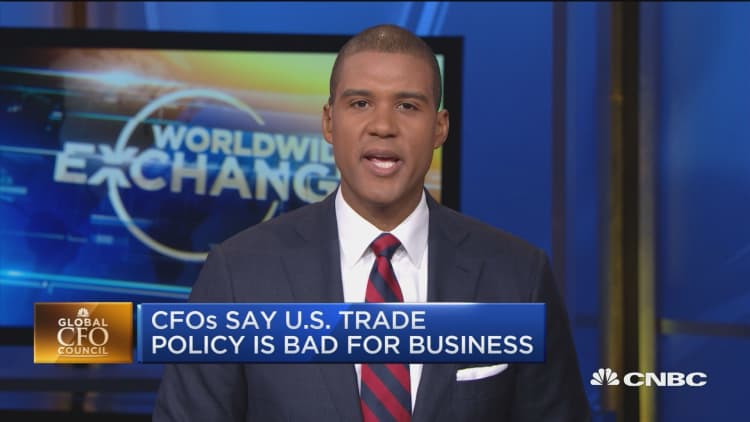Things were looking good for the Dow Jones Industrial Average. It had been on an eight-day winning streak before Monday's morning's decline and the U.S. stock market bellwether is still close to a new record. But you would not know that from the way chief financial officers of major corporations are thinking about stock market value right now.
A survey of chief financial officers in the U.S. and around the world shows stock sentiment from within the C-suite as being far from confident. And that's a nice way of putting it.
When asked which will happen first — the Dow will cross above 28,000 for the first time or fall back below 23,000 — more than twice as many CFOs think the Dow will fall back below 23,000, according to the CNBC Global CFO Council Survey for the third quarter 2019.
Breaking down the CFO responses by region is important.
Asia-Pacific region CFOs are by far the most pessimistic about the short-term outlook for the U.S. stock market. Eighty percent of these CFOs think the Dow is more likely to first suffer a major sell-off of as much as 4,000 points.
The view from U.S. CFOs arguably is more important, and the telling result from this group is not extreme pessimism but lack of conviction. Among U.S. CFOs the most popular response to this question — chosen by 43% of CFOs — was "not sure."
These CFOs also were more likely to say the Dow will fall back to 23,000 (30%) than cross 28,000 (26%).
Across all three regions surveyed — North America, Europe and Asia — no group of CFOs held the belief that the Dow is more likely to cross 28,000 first.
The CNBC Global CFO Council represents some of the largest public and private companies in the world, collectively managing more than $5 trillion in market value across a wide variety of sectors. The Q3 2019 survey was conducted between Aug. 21 and Sept. 3 among 62 global members of the council. The survey was conducted after what had been a steep decline in the Dow in early August, and high volatility in stocks that continued throughout the month. Stocks were rebounding during the period of days in late August and early September when CFOs responded.
It is important to not overstate the importance of a single survey finding, but it does reflect the extent to which general uncertainty over the global economy and U.S. trade policy may be weighing on short-term market confidence from within the C-suites of major companies.

"CFOs are generally very confident in such matters, and if 40%-plus have no view at all ... well, I can't think of a better way to demonstrate the uncertainty business leaders are facing right now," said Jack McCullough, president and founder of North Andover, Massachusetts-based CFO Leadership Council. "The ability to be decisive is being taken away from them."
He added: "They are usually opinionated on this, even if they are not right."
In fact, CFOs were opinionated, and right about this question, in the fourth quarter 2018. In the November 2018 CFO Council survey — at a time when the Dow was trading around 25,000 and had been experiencing volatility — the majority of financial officers indicated the Dow was more likely to fall by 2,000 points (to 23,000) than rise to 27,000. They turned out to be directionally correct when the Dow tanked in December, falling to as low as 22,000.
A broader uncertainty is reflected in other third-quarter CFO survey findings: Chief financial officers said U.S. trade policy will have a negative impact on their business in the next six months, and the majority said they are not likely to increase capital spending and hiring above current levels. Lack of investment from businesses is a factor that Federal Reserve Chair Jerome Powell recently cited as a concern for the U.S. economy.
But the majority (65%) of CFOs also indicated a belief the U.S. will not fall into a recession in 2020.
Measuring Dow gains
Stocks are booming this year, with the Dow up more than 16%, but the index came into 2019 with a lot of ground to make up. The Dow had lost over 11% in the fourth quarter of 2018. Over the past one-year period, the Dow is up roughly 4%.
The Dow's eight-day winning streak ending last Friday was the first time that happened since May 2018, and the index notched its third positive week in a row for the first time since June of this year.
Some trading experts, such as Charles Schwab vice president of trading and derivatives Randy Frederick, have been looking for reasons to tend to the pessimistic, with the brutal fourth quarter of 2018 still a recent market trauma — though a one-year trading comparison is far from a statistical correlation.
According to him, major volatility remains a risk. With a big Fed rate decision coming up later this week and new talks between the U.S. and China slated for October and investors sitting on double-digit year-to-date gains, more could be motivated to take profits.
The drone strikes on a major Saudi oil-processing facility at Abqaiq and the nearby Khurais oil field on Saturday, which knocked out 5.7 million barrels of daily crude production, or 50% of the kingdom's oil output, was expected to weigh on stocks on Monday, with higher oil prices providing another headwind for a slowing global economy. Saudi Arabia indicated that it might be able to restore one-third of its lost oil output by Monday, and the U.S. indicated it was prepared to release emergency stockpiles of oil if necessary. Tensions in the region remain high, with President Donald Trump saying the country is "locked and loaded" and senior American officials alleging Iranian involvement in the strikes.
Professor Aswath Damodaran, NYU Stern School of Business professor and often called the "dean of valuation," said it is fair to hypothesize that the general level of uncertainty from the C-suite can be explained by a confluence of indicators that may or may not be suggesting that the global economy is slowing, in conjunction with Brexit (and the resulting uncertainty in Europe) and the U.S.-China trade war. It also is logical to argue there is more negative conviction about the Dow's direction from Asia because China is central to almost every Asian economy's performance, and that makes the U.S.-China skirmishes take on an outsized role.
But he stressed that making a call on the overall market should always be preceded by the following statement: "Your guess is as good as mine."
Damodaran did say the effect of uncertainty on value is likely to be muted, unless the CFOs' fear spreads to investors, who start to price it in.
There was a rotation into value stocks last week that some in the market saw as an indication of more defensive posturing by stock investors. The Dow ended the week heading closer to another record.
Damodaran said there is an argument to be made that a more defensively positioned CFO action could influence stock value, but only modestly. "The reluctance to invest will have a negative effect on value, but if the cash that would have been used on the investment gets paid out as dividends or in buybacks, the net effect is likely to be small," he said.






